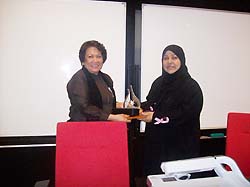Sheikh Mohammed Hussein Al-Amoudi Chair for Breast Cancer Research Takes Part in KAUST Activities
|
|

|
|
In response to an invitation from King Abdullah University of Science and Technology (KAUST), a team representing the KAU-based Sheikh Mohammed Hussein Al-Amoudi Chair for Breast Cancer Research has taken part in an educational meeting on breast cancer held by KAUST for its members of staff.
The meeting discussed the prospects of cooperation between KAU and KAUST in the fields of research, education and training.
Dr Frial Salih, Head of KAUST Medical Services Division, pointed out that the meeting was the beginning of a series of meetings to be held on regular intervals.
In his speech, Mr Faris Al-Shamri, of KAUST, outlined the local and international achievements of Dr Samia Al-Amoudi, Supervisor of Sheikh Mohammed Hussein Al-Amoudi Chair for Breast Cancer Research.
Addressing the meeting, Dr Al-Amoudi briefed the audience on the situation of breast cancer in the Middle East, revealing some statistics obtained from some Arab countries and stressing that little had been done in the Arab world in the field of breast cancer research.
According to her, social and some other factors are hampering efforts to foster an early breast cancer screening culture in KSA, maintaining that the chair was exerting strenuous efforts in this regard by introducing new breast cancer screening centers and mammogram mobile units.
She also extended invitations to some participants in the meeting to take part in a meeting of breast cancer experts to be held by the chair at KAU from 10-13 November 2009 with aim of investigating, among other issues, the researches on breast cancer among young ladies.
She also said that the visit was a dream come true, describing KAUST as a great academic institution which would shape the future of our younger generations.
Prof Hassan Abduljabbar highlighted the activities of the chair and its research partnerships with a number of institutions in Geneva and USA.
Dr Wafa Seit spoke about the significance of fostering an early breast cancer screening culture among the public and health services providers.
|
|